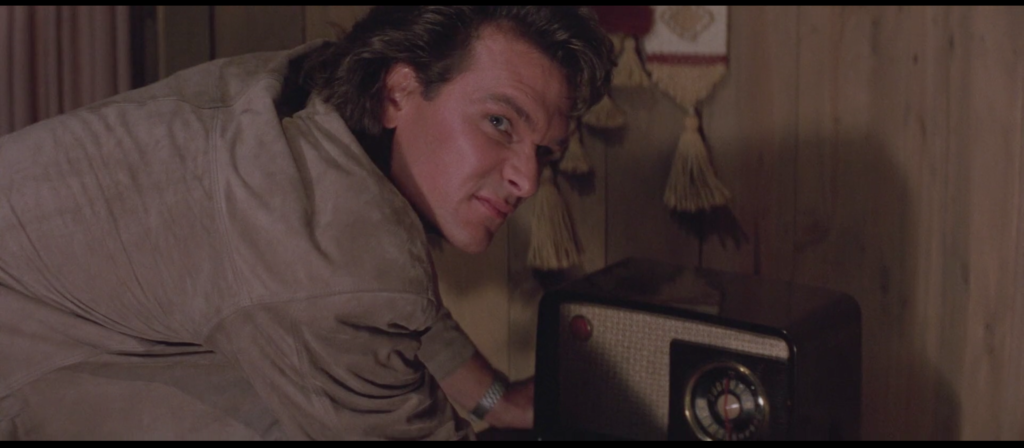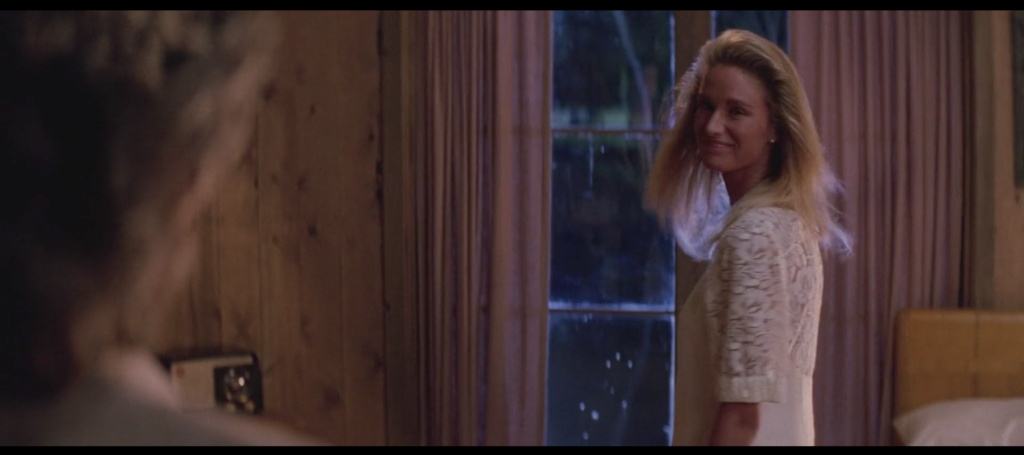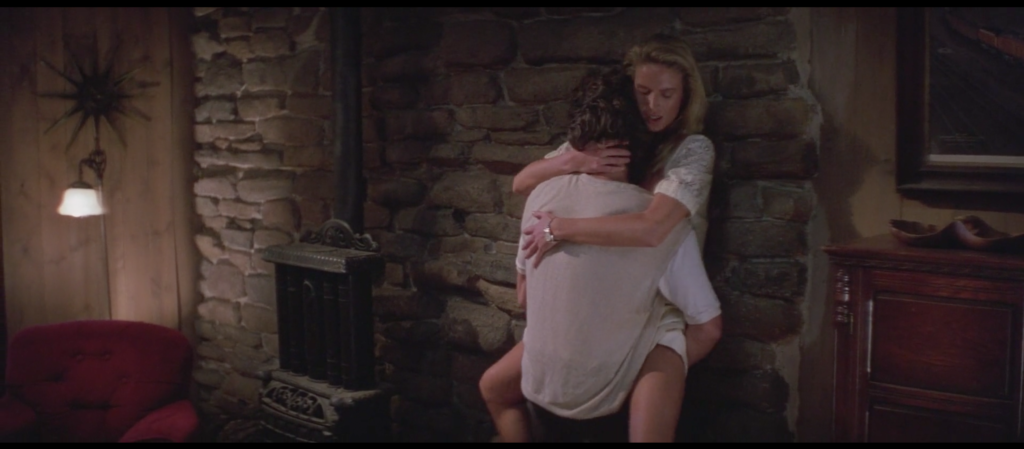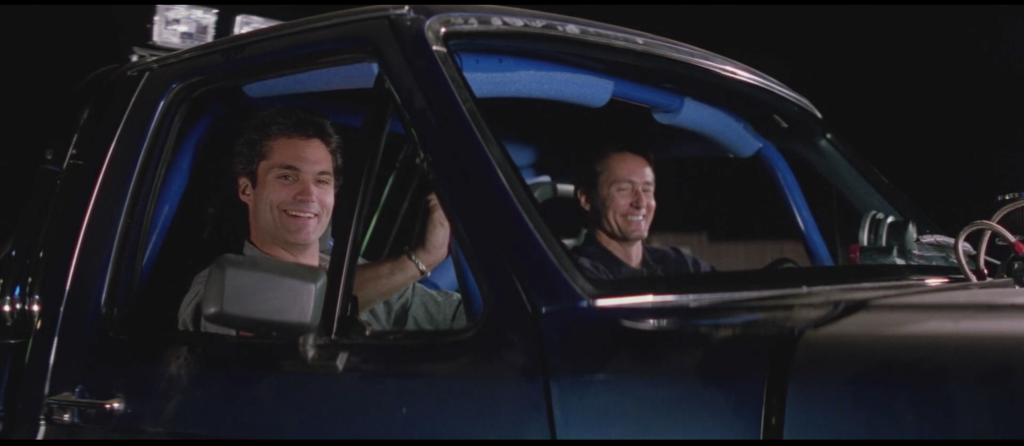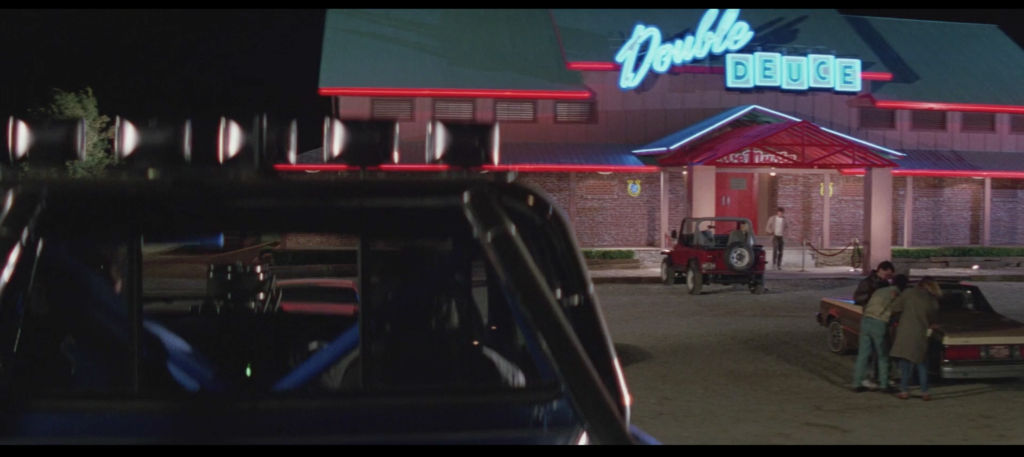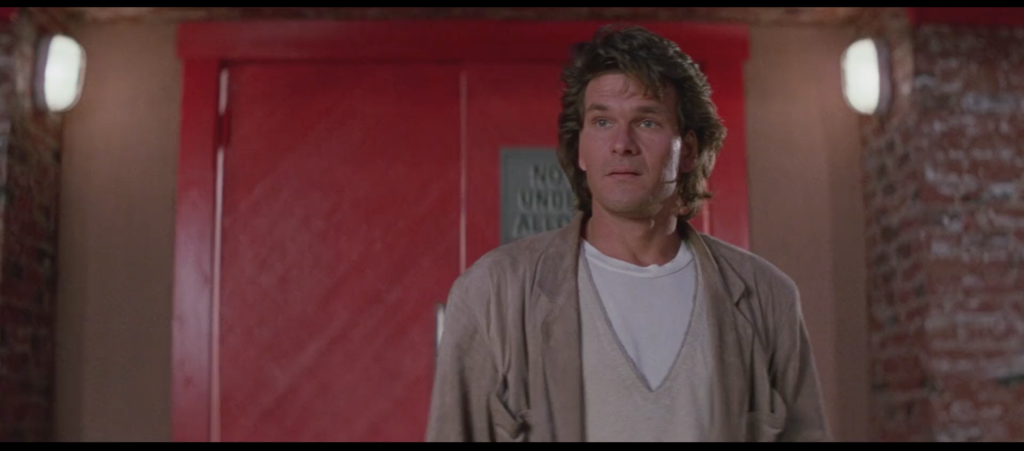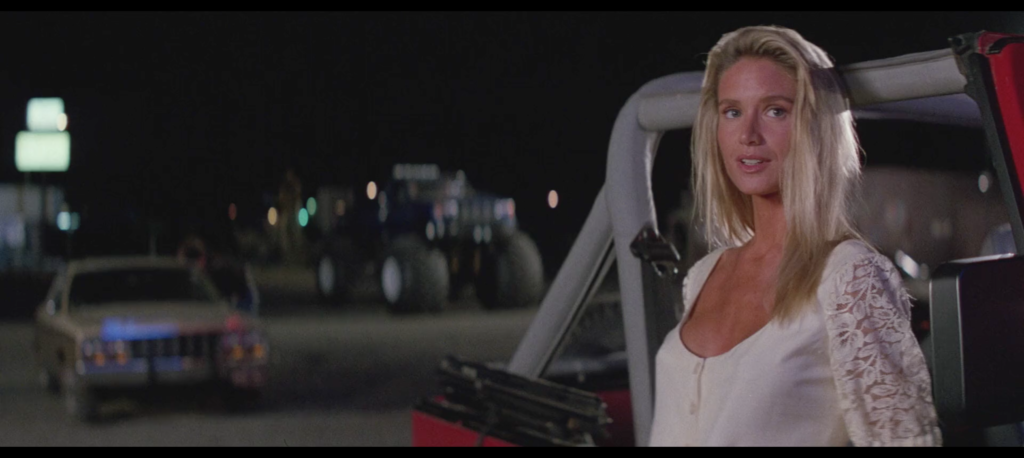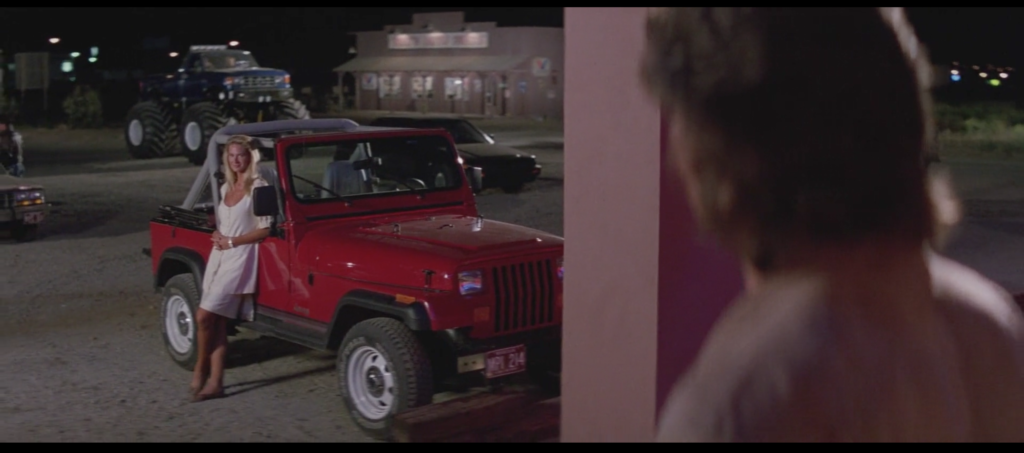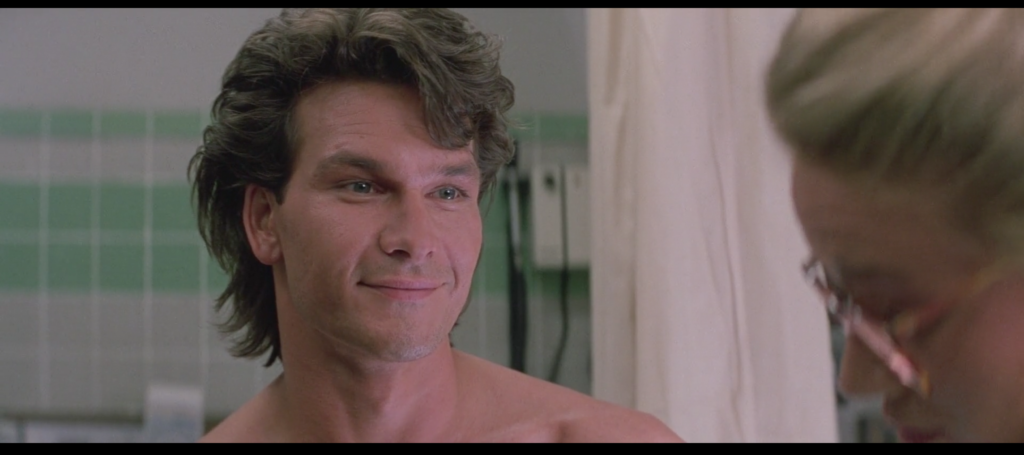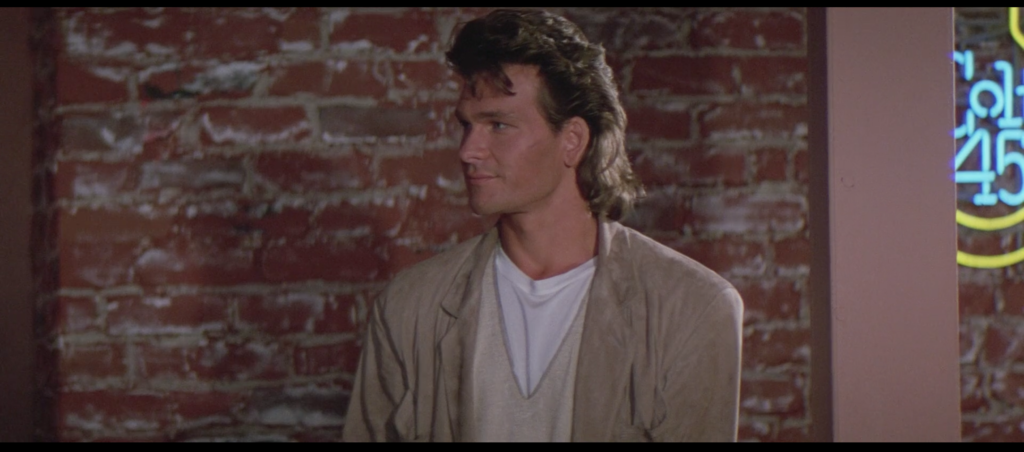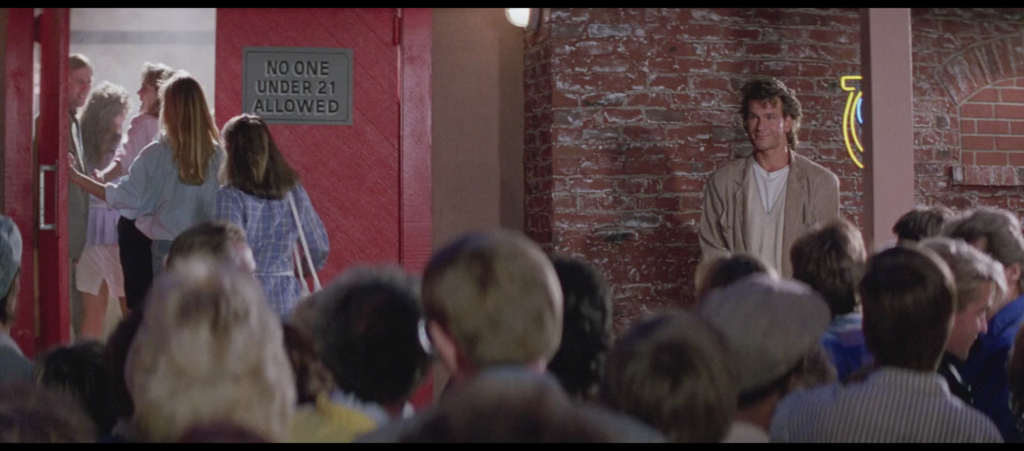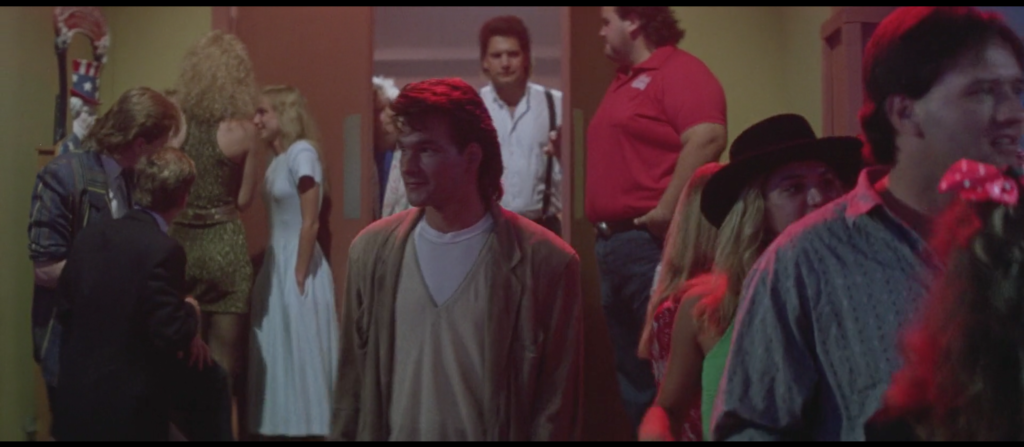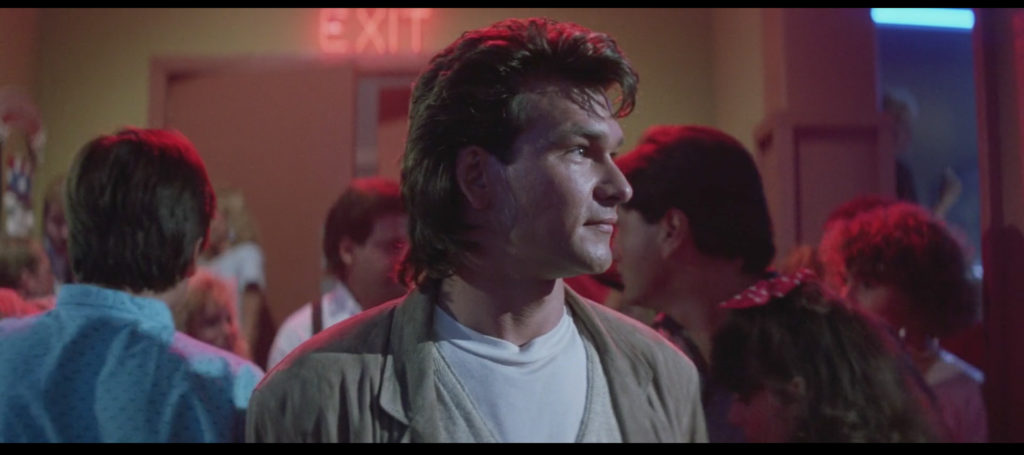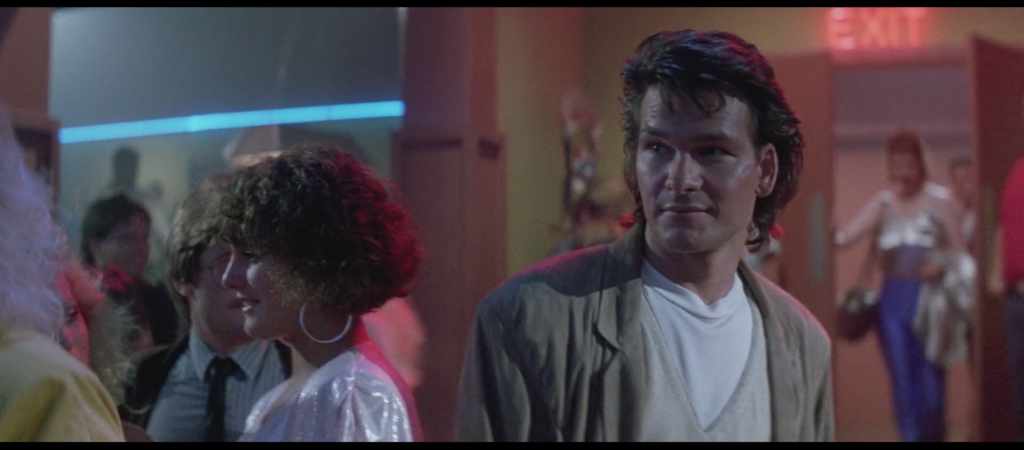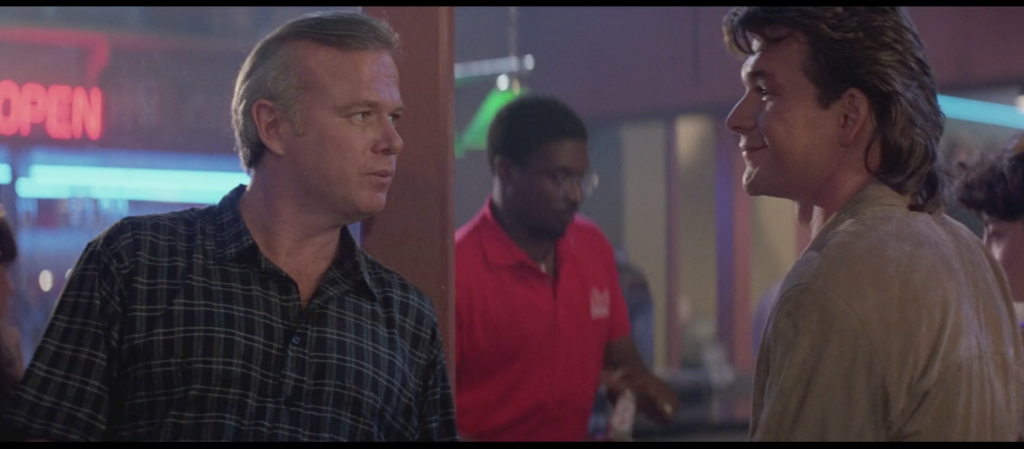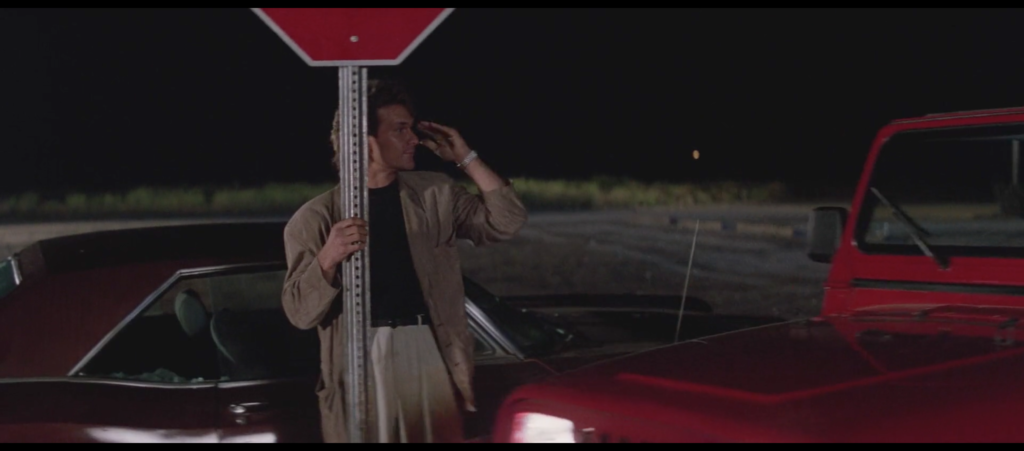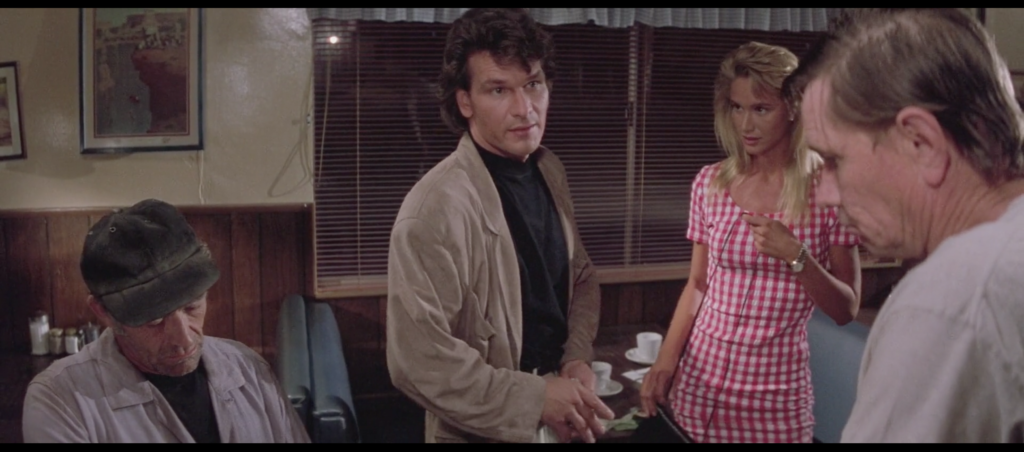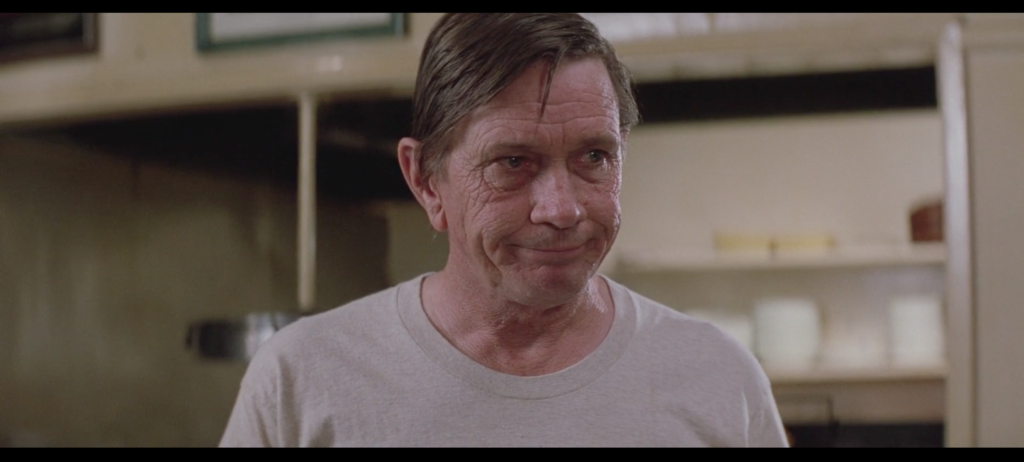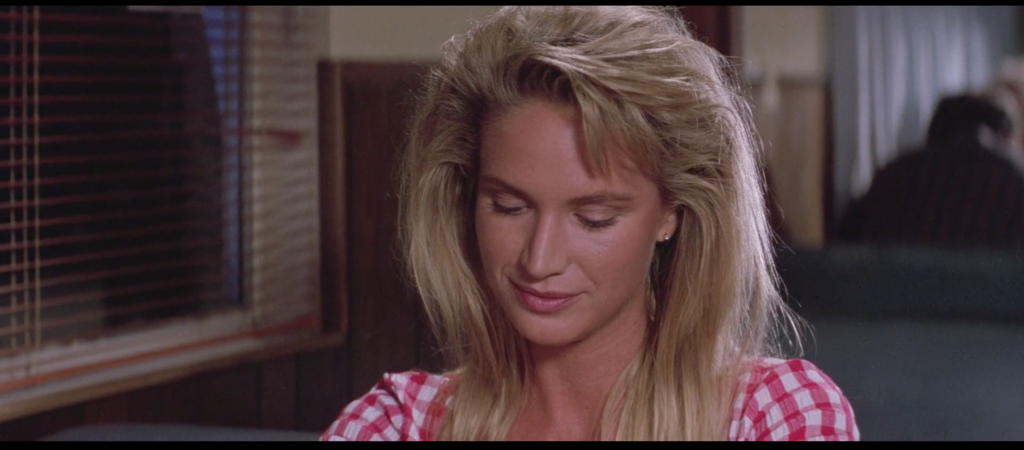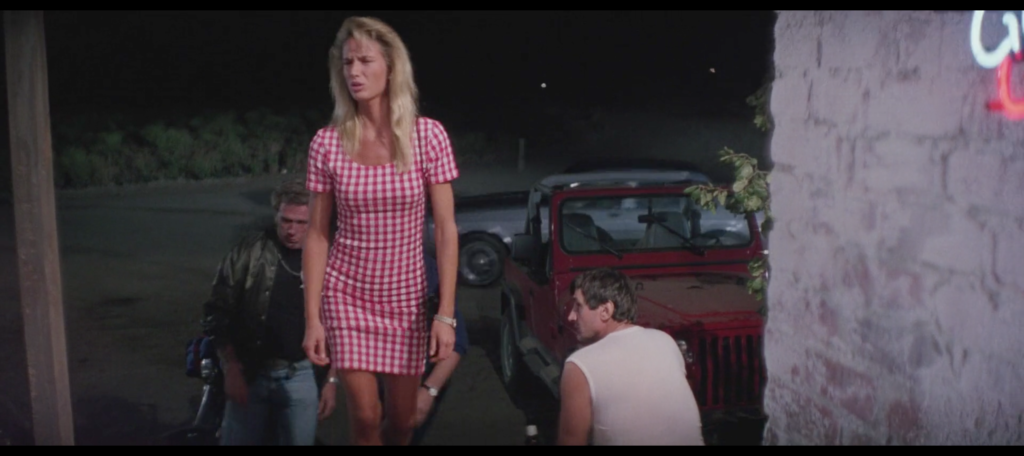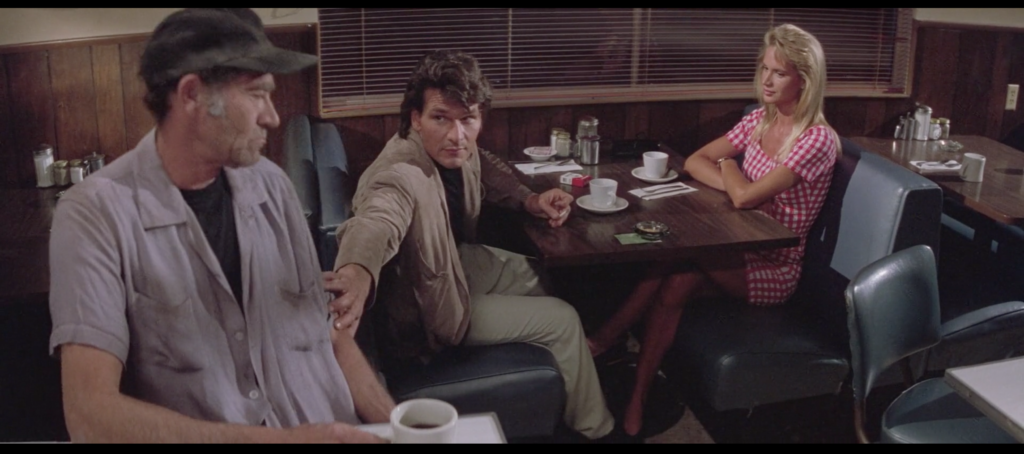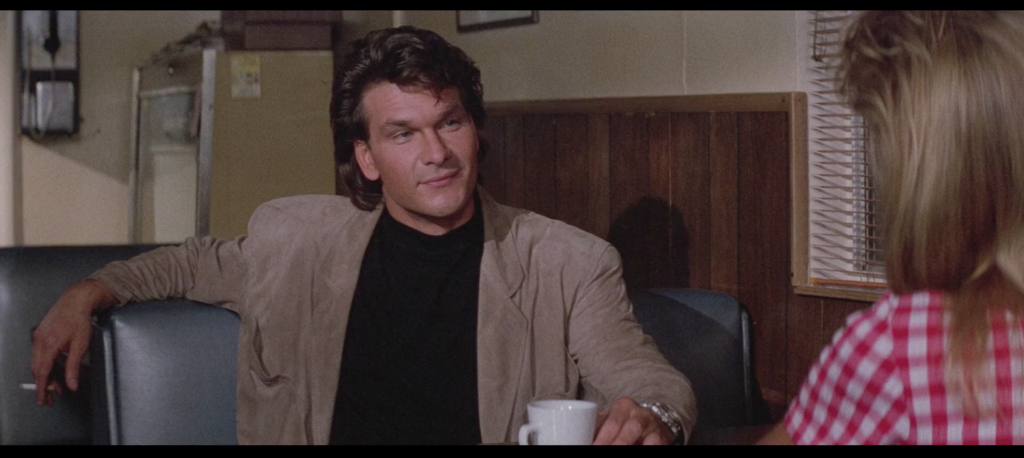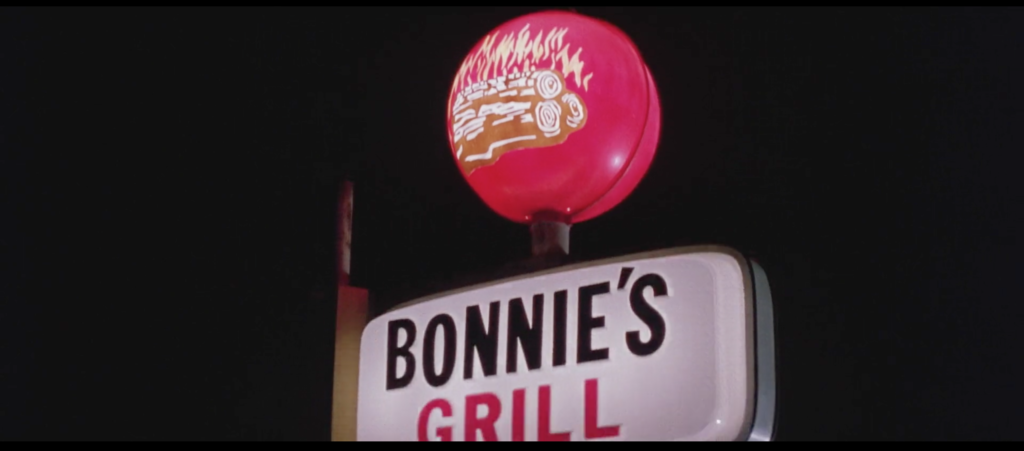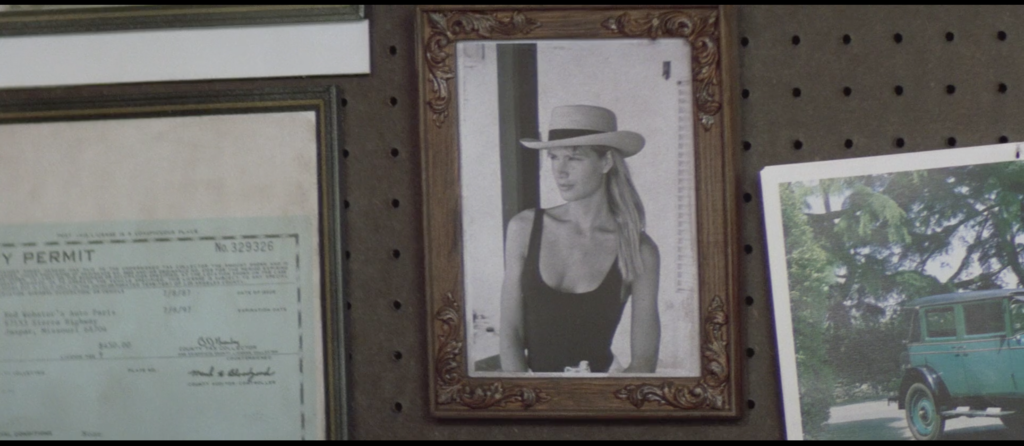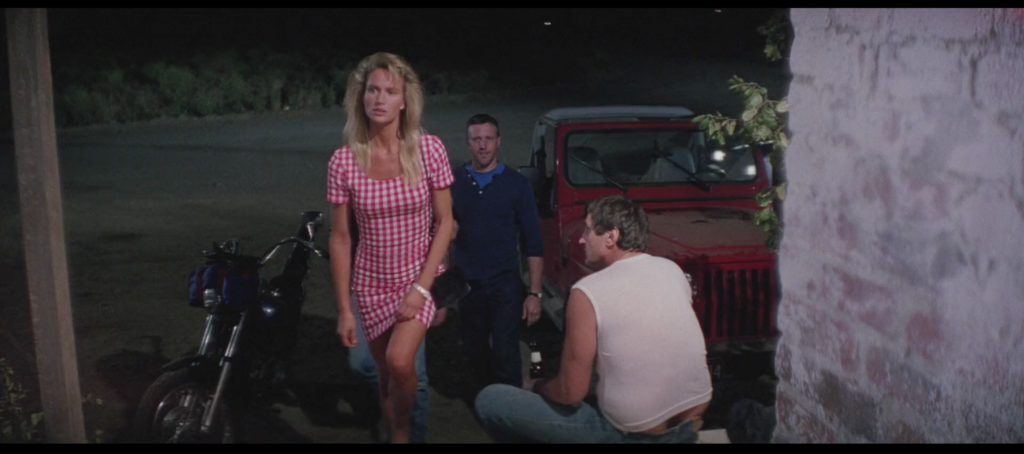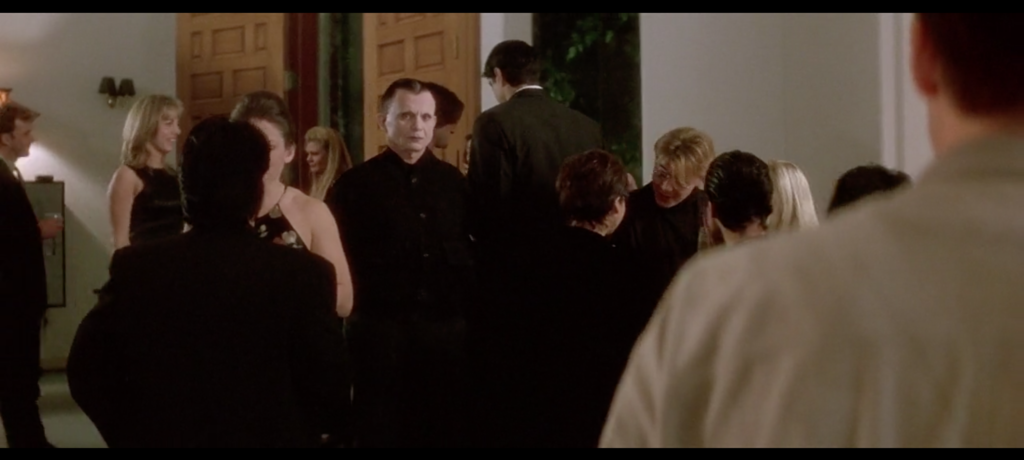Posts Tagged ‘dr. elizabeth clay’
202. I Sold My Soul to Rock ‘N’ Roll
July 21, 2019Or rather, Dalton and Dr. Elizabeth Clay do not sell their collective soul to rock ‘n’ roll. As Dalton flips on the radio to find some mood music, they get as far as one complete recitation of the titular phrase from the song by German heavy metal band Bullet before wrinkling their noses, nodding “no,” and changing the channel. It’s 1989, and a quick listen of that high, multi-tracked vocal chorus reads “hair metal.” It reads inauthenticity, pretty boys, heshers, idiots, poseurs, L.A.—you could just as well say “40-year-old adolescents, felons, power drinkers, and trustees of modern chemistry.”
My pop-cultural awareness began in 1988, when my grandmother got me Appetite for Destruction for Easter. It blossomed fully, to the point where I consider it the dawn of my life as a thinking consumer of popular culture, the very summer Road House came out, in the form of Tim Burton’s Batman. In between there somewhere, I started watching MTV. As such I can assure you that didn’t need to have Nirvana in the zeitgeist to figure that there was something suspect about hair metal at the time. You didn’t even turn your nose up at metal entirely. Metallica were gigantic already, thanks to the video for “One.” Living Colour and Faith No More had absolutely massive alternative-inflected hits with “Cult of Personality” and “Epic,” emphasizing groove rather than shimmy and slink. And though no one appreciates this now, Guns n’ Roses’ oppositional relationship to the poodle-haired likes of Poison, Slaughter, Winger, and their close personal enemies Mötley Crüe genuinely made Axl Rose the John the Baptist to Kurt Cobain’s Jesus Christ. It was that distinct.
Of course I doubt any of this would be relevant to Dalton and Doc. When we first hop into his Benz as he departs the parking garage back in New York (the “what do I look like, a valet?” scene), the station on the radio is 102.7. That’s WNEW, New York’s storied home for classic rock. You weren’t getting anything flashier than “Rebel Rebel” or Thin Lizzy on that. As we see from his friendship with Cody, roots rock—white blues, blue-eyed soul, and most likely the original African-American article as well—are Dalton’s specialty. Sure enough, the moment he stumbles across the opening “These…arms…of…miiiiiiiiine” from Otis Redding’s torch song of the same name, Dalton does not touch that dial.
The interesting thing here is that Bullet are not hair metal, not really. Here, have a look and a listen:
Mustaches? In my hair metal act? Not bloody likely. This is just straight-up party metal, its fast-paced rockin’ boogie part of a transitional sound that combined the increased punk-inspired ripped-denim sneer of the genre as displayed by New Wave Of British Heavy Metal bands with the sweaty good-time glam of Slade, the New York Dolls, Thin Lizzy to a certain extent, and the like. This was a popular move at the time—ask Quiet Riot or Twisted Sister, to say nothing of the Brits themselves—and there’s no reason Germans couldn’t do it too. (One look at the album cover will have you thinking of Spinal Tap’s faster-paced parodies, like “Tonight I’m Gonna Rock You Tonight”; that movie also came out in 1984.)
But Road House needed something that signified all that bad shit I listed above, and whether because it was cheaper or because music supervisor and future Interscope head/Beats by Dre billionaire Jimmy Iovine didn’t want to alienate his Sunset Strip contacts, Bullet got the nod. And insofar as the song sounds like the soundtrack to a barfight, perhaps it wasn’t such a bad choice. Dalton just does to the song what he’d do to its physical equivalent: end it quick.
201. Chez Dalton
July 20, 2019“It’s quiet,” Dalton says. “The horses let me know if anybody comes around.”
“I love it,” Elizabeth replies, her smile and voice as warm and sincere as if she had just gotten her first glimpse of her new dream home, which she has.
She doesn’t know that yet, of course, but why wouldn’t she fall in love with Dalton’s barn loft apartment. She met up with him earlier that night with the expectation of having sex with him provided nothing goes egregiously wrong, and so far so good. She’s into this guy. And this apartment could not be more this guy if he’d designed it himself.
Think of it this way. Dalton lives in a structure created to house the comforts that animals require. The closest neighbors are horses. The room is open to the outside world, allowing him free egress. It’s a place for a domesticated but still half-wild thoroughbred animal to rest, relax, and refuel before charging back out into the world unimpeded. This is Dalton’s stable, and the barn door is perpetually wide open. This horse can get loose anytime he wants. In the meantime, of course, he’s available for rides.
200. The sex scene from Road House
July 19, 2019It looks uncomfortable, like it would strain his back and abrade hers. It looks lackadaisical, like two grown adults couldn’t be bothered doffing the oceans of loose-fitting fabric in which they’re garbed before starting. It sounds awkward, since the verbal foreplay in which the participants engage consists solely of the woman discussing her ex-husband and her uncle. It sounds incongruous, with all of the above soundtracked by the platonic-ideal lust and soul and yearning of Otis Redding’s “These Arms of Mine.” It feels abrupt, as their hands move to each other’s belt buckle and underwear before their lips meet, when a kiss has only been teased. It feels brazen, as she takes him inside herself/he puts himself inside her after the briefest gesture in a kiss’s direction. It’s intimate, this decision to make love while deliberately eschewing certain forms of intimacy as if superfluous to the intimacy already established. It’s silly, so much so that first she and then he laugh in the middle of it from the sheer sexy ridiculousness of it all. It’s hot, watching this process unfold from zero, seeing two beautiful people get horny, knowing what’s happening to his body and to her body as a result, watching them do what bodies in those conditions are designed to do. It’s right there in front of us, the camera bringing us up close against their faces, their hips, their hair, their hands, his undulating body, her grasping legs. It’s Patrick Swayze and Kelly Lynch having sex standing up against a wall made of huge rocks. It’s the sex scene from Road House. It stands alone.
199. The new marshal in town
July 18, 2019Dalton is in a Western whether he wants it or not. That’s the message sent to him by Dr. Elizabeth Clay, who greets him as they meet up for a late-night rendezvous by saying “I hear you’re the new marshal in town.” “You heard wrong,” he response perfunctorily; he’s said “Opinions vary” with more force. I think that after the decision to not be nice to Brad Wesley, to treat it as personal rather than a job with Brad Wesley, Dalton is still struggling with that decision. The enormity of it pains him, as life changes forced upon us by circumstance often do. He can live with threats, obviously; that’s the nature of his job. But the meaning of the threats, the rationale behind them, his culpability in soliciting them by doing what he’s doing regarding Wesley—all of that is new, and hard to swallow. As late as their post-coital pillow talk several minutes or hours or whatever later he’s still talking about moving on, getting out of Jasper, finding a new adventure. He’s talking about it to Elizabeth, no less, whom he’s just bedded down (or rather bedded up). She’s the one who asks then, just like she’s the one who brings up the idea that he’s a lawman taming the Wild West, thwarting outlaws and bandits one barfight at a time, now. She additionally notes that his body will give out early at the rate he’s going through injuries, inflicted and sustained. She recognizes the tension at work in Dalton: His instinctual pursuit of justice and order and his determination to be a man bound by no law or order stand at odds. She, like he, is content to fuck away the difference for the time being. It’s amazing, the balm that a little pleasure can be in a life that’s fundamentally unsustainable.
198. Dig a hole
July 17, 2019“Work ain’t work when you’re having fun.” By Jimmy’s own definition, then, his bit of late-night = espionage outside the Double Deuce, where he and Ketchum catch Dalton and the Doc meeting up, isn’t work. The two men are having an absolute blast discovering that their boss Brad Wesley’s ex-wife is dating his new-in-town nemesis.
“Uh-oh…” says Ketchum wryly as they take it all in.
Jimmy chuckles, rears his head back slightly, and says “Dig a hole.”
The two men then chortle and guffaw at the prospect that one or more of the people they’re spying on will be slain and buried in an unmarked grave for the crime of being an item. It’s all in the way you tell it, I guess.
It’s a noteworthy moment for several reasons. First, it’s one of the few chances we have to see goons goon it up all on their own: no one to intimidate, no one to suck up to, just two peers enjoying their job together. We’ve seen how different Dalton feels under similar circumstances, chatting with old friends like Cody and Wade Garrett. We’ll see a bit more of it among the goons near the end of the film, when Pat, Morgan, and Tinker take a few moments to discuss a young woman of their acquaintance, before Dalton assaults the mansion they’re guarding and murders most of them. The same principle applies here. Left to their own devices, out from under the watchful eyes of either Dalton or Wesley, they’re good-time Charlies. In actor Marshall Teague’s full-throated rumble, “Dig a hole” may as well be “Laissez les bon temps rouler.”
Second, we get a glimpse of how they see their own boss through this instinctual, jocular reaction to what they’re observing. They don’t say “Uh-oh, I wonder what the boss is gonna say,” or even “Uh-oh, the boss is gonna be pissed.” They jump straight to “Uh-oh, it’s murderin’ time.” When they see Brad Wesley’s ex with another man, they just assume that someone’s gonna die for it, presumably at their hands or the hands of their fellow goons. It’s just how things are done here in Jasper. This off-hand wise-aleck remark reveals as much about life under Brad Wesley as Karpis tossing Red Webster’s store or the whiskey getting cut off at the Double Deuce. More, perhaps.
Third, see the eyelines in that image above? Jimmy and Ketchum are looking downwards from the front seat of their vehicle to spy on Dalton and the Doc. That’s because their vehicle is a monster truck.
Admittedly, such a vehicle presents certain advantages on a reconnaissance mission, providing mobile high ground from which to observe the surroundings. On the other hand, and see if you follow me here, they drove a fucking monster truck to a stakeout.
They’re in the same goddamn parking lot, no less! It’s not like they could be inconspicuous if they wanted to, but they’re not even trying to hide it.
Why do neither Dalton nor Elizabeth notice the professional killers staring at them and yukking it up while perched some ten feet in the air in a comically massive motor vehicle? Maybe all that smoke blurred Dalton’s vision. Maybe his cooler-sense fails him when he’s horned up. Maybe there are enough monster trucks tooling around the streets of Jasper that Dalton would have no reason to believe this is the one driven by the guy who tried to kick him to death. Maybe—and again, stay with me here—it’s an extremely goofy movie. It’s a matter of opinion, I suppose, and you know what they say about opinions. Just remember, “Dig a hole” is not an opinion. As far as Jimmy’s concerned, it’s a spoiler.
197. Whatever happened to predictability
July 16, 2019What you’re seeing here is the look on Dalton’s face just after he staggers out of the smoky Double Deuce and finds Dr. Elizabeth Clay waiting for him, and the look on Dr. Elizabeth Clay’s face as she looks back at him while leaning back against her car one frame later. I don’t think you need to be an expert analyst of body language or facial expressions or human mating rituals to figure out what’s going on here, and what will be going on shortly hereafter. The Doc is about to get lucky, and Dalton feels lucky about it. That’s predictable enough: They’re both right, as it happens. But how it happens—ah, friends and neighbors, there’s the rub. (The rub against a rock wall, specifically.) It will be absurd, romantic, laughable, red hot, impersonal, extremely personal, erotic, uncomfortable, uncomfortably erotic, erotically uncomfortable, giddy, bold, slightly impractical, intensely physical, eminently watchable. It will be, in short, the Road House of sex scenes. It could be nothing else.
196. Hotbox
July 15, 2019At the end of a long, close to perfect night, the Double Deuce is smokin’. Literally. After the evening represented by the “Roadhouse Blues” scene winds to a close, Dalton stumbles through the big red double doors of the Double Deuce in a cloud of smoke. He rubs his eyes, as if they’re dry and irritated. He breathes out a plume of smoke himself. “Cigarettes and exhaustion” is surely what director Rowdy Herrington and company were going for; “Raindrop, drop top, smokin’ on cookie in the hotbox” is what many a viewer receives. If you’d slapped some designer sunglasses on him, replaced his shapeless beige sport jacket with a fur coat, and shot this in slow motion it’d look like an old Snoop Dogg video. That image and vibe is certainly preferable to the alternative, which is that to get rid of the smell of cigarettes he’d probably need a Silkwood shower. But he’s not one to get rid of the fragrances of nature, to use Emmett’s memorable phrase, and in Dalton’s world the constant presence of lit ciggies is as natural as it gets. More than once we see him light up without even bothering to put a shirt on first. The man has his priorities. And you know what they say about where there’s smoke.
191. Pain don’t hurt revisited
July 10, 2019When I first addressed “pain don’t hurt” I did so from the perspective of Dr. Elizabeth Clay. She’s in the process of mending a knife wound in the side of a man who has to be the single oddest person she’s ever treated, and he drops that on her? Once you’ve seen the whole movie, once you know what we know about her—her reaction to Dalton’s violent job, her feelings for him as a person she cares about and is more afraid for than afraid of, her past relationship with Brad Wesley for whom the opposite is true—you know that line probably knocked her on her ass a bit. Enough to get her to accept his offer of a date for coffee, anyway.
But look at him! Look at the shit-eating grin on the face of James Dalton after he tells a trauma surgeon or whatever she is that pain don’t hurt. Actually, scratch that, just look at the grin, the smile, the smiling eyes too. Patrick Swayze, the god, at work, showing you just how smitten he is with this woman already. I’ve seen lovers in real life look at each other when the other isn’t watching, and that’s what it looks like. Goofy, glad, unguarded. It’s moments like these when you take off your metaphorical shirt and expose your figurative wound and think “I trust this person to care for this” and just smile at how lucky you are to have found them.
It changes how we read Dalton’s self-evident self-satisfaction when he says his three-word maxim, doesn’t it? Because he’s proud of the line, and he’s even prouder of the lifetime of experience in word thought and deed that led him to draw that conclusion, but he’s proudest of having said it to this fascinating woman.
I’m not saying he’s like a little boy trying to please Mama or a puppy gazing with love at his master. I don’t think Dalton feels subordinate to her in that way any more than he feels subordinate to anyone else save Wade Garrett. (Man, that’s an essay waiting to happen.) I’m saying he’s pleased to show her the best of himself, in every respect: his perfect body, his sharpened mind, and his mastery over both of them. He’s happy to impress her. He’s happy to be impressive. Judging from his face I don’t think he’s ever been happier to be impressive. He’s finally found someone worth impressing.
189. All Smiles No Blues
July 8, 2019A partial list of things Dalton smiles at during the “Roadhouse Blues” scene in Road House:
- The parking lot
- The crowd waiting in line to get in
- The guy counting attendance
- Jack the bouncer
- The crowd to his left
- The crowd to his right
- The Jeff Healey Band
- The pool table area
- The dining area
- The crowd at the bar
- Ernie the bartender
- His coffee
- The crowd on the dancefloor
- Frank Tilghman
- The prospect of taking care of Frank Tilghman’s problems
And the night is still young for him, too! By the time it’s over he’ll also have smiled at Dr. Elizabeth Clay in his parking lot, Dr. Elizabeth Clay in his apartment, Dr. Elizabeth Clay in her car which he’s driving, Otis Redding on the radio, Dr. Elizabeth Clay on his erect penis, and Dr. Elizabeth Clay nude on his roof. (Otis seems like the odd man out there until you consider his vital role in that particular progression.) None of these smiles are sardonic or wry. None are directed at stop signs torn from the ground and speared through his car windows, or at people who have or soon will have tried to stab him to death. These are genuine smiles of happiness, from a man who finds himself surrounded with the best things in life: happy crowds, good drinks, admiring proteges, soul music (blue- and brown-eyed varieties), Kevin Tighe, open-roofed motor vehicles, public nudity, the welcoming sex organs of a beautiful woman with a doctorate degree. The Dalton Path leads to a far green country.
162. Kiss
June 11, 2019Dalton and Elizabeth’s first kiss is as much a kiss of acceptance as of romance. Their awkward, oddly hostile first date concluded, they have returned to the parking lot of the Double Deuce so Dalton can pick up his car to drive it back to Emmett’s ranch. They find its tires flattened and its window impaled with an uprooted stop sign. Doc, quick-witted as ever, quips “Your fan club?”
“They are devoted,” Dalton chuckles.
“You live some kind of life, Dalton.” This is delivered as a summation of the night’s conversation. Whether he’s ever been bested, ever been put down, ever wondered why, ever thought about the morality of accepting money to beat people, ever considered whether or not his nice guy act works—in seeing that ruined car Elizabeth appears to realize that these questions are moot. Dalton is a man willing to martyr himself so the kinds of people who’ll fuck up some guy’s car just for doing his job don’t get to do it to other people more vulnerable, less capable of fighting back. She heeds the stop sign, in other words, and lays her doubts to rest, for now anyway.
Dalton doesn’t know this yet. He sees his ruined car and sees, well, a ruined car. Now that part of his life has been displayed to the Doc, along with his battered body. It isn’t a pretty picture. (Not even his perfect physique is necessarily that impressive to someone who’s stapled it shut.)
“Too ugly for you,” he says. In classic Road House fashion this is a statement, not a question. He’s offering an answer of his own.
Then comes the happy surprise, the eucatastrophe, from the mouth of the Doc: “I didn’t say that.”
The kiss that follows (after some awkward seatbelt fumbling) is soft, nearly chaste, one sustained contact with the lips and then a release. It’s a benediction. So much is said with this one kiss that when the time comes for Dalton and Elizabeth to make love, neither feels the need to kiss again until the act has been consummated. To the extent that a kiss is the physical expression of intimacy, what can be more intimate than “I understand”?
158. Salute
June 7, 2019Some men see a bouncer who gets paid a low-mid six-figure yearly salary to beat up the agents of a local racketeer with a Fotomat in a dirt-parking-lot dive-bar shithole in Jasper Missouri conclude a date during which he got read to filth to his face multiple times by a woman he met in a trauma ward when she stapled his latest stab wound shut without anesthesia before showing up to their date while he was in the middle of a street fight by giving her a chaste kiss on the lips and then saying goodbye with a weird little half-assed naval salute while holding the stop sign his enemies jammed through his car window after slashing all his tires and say, why; I watch Road House and say, why not?
154. Tonight’s rent
June 3, 2019Road House is all over the map when it comes to crusty weird old guy solidarity. It is undoubtedly true that a Frank Tilghman/Pete Strodenmire/Red Webster/Emmett alliance tandem-murders Brad Wesley to end his reign of terror and free Jasper forever. But this requires the sacrifice of their comrade in grizzledness Wade Garrett, as well as a great deal of groundwork laid by young Dalton, who murdered five people and incapacitated a sixth with a stuffed polar bear so that the old timers could infiltrate the Wesley compound. Moreover, it is precisely the lack of solidarity shown by Brad Wesley, himself a weird old man, that necessitated this revolution of the geriatrics in the first place. And where does this leave Big T and the red-hatted gentlemen who are among the Four Car Salesmen of Jasper, Missouri? Excluded, alienated, and atomized, that’s where.
Dalton, perforce, addresses a similar breach as his deeply weird bad date with Dr. Elizabeth Clay winds to a close. “Pretty soon I’m gonna have to start charging that bum rent!” growls the counterman at the diner, presumably the owner judging from his literal rent-seeking behavior, regarding the exhausted and/or drunk gentleman Dalton kept from collapsing onto the floor a few seconds earlier. Stepping in to do so once again, Dalton reaches into the pocket of his ostentatiously loose-fitting white trousers and throws some money onto the counter in the owner’s direction. “Tonight’s rent,” he deadpans, leaving the old bastard to scowl and the other old bastard to sleep in peace.
Here we see the fraying seam between Dalton’s priggish elitism and his salt-of-the-earth affectations more clearly than ever before. He rights for the rights of everydrunk, provided he’s not being paid to keep such men out of his place of work. (Recall if you will the power drinkers and the trustees of modern chemistry.) He’s a liberator armed with the money he earns in the course of oppression. He’ll take care of tonight but tomorrow you’re on your own. Maybe Doc is right. Maybe he isn’t a nice guy after all.
152. It’s a dirty job
June 1, 2019Let the negging commence. With his typical poetic elision and equally typical lack of awareness as to how he might come across to a normal person, Dalton has given the Doc his best guess as to why he’s been so successful as a bouncer and cooler: “The ones who go looking for trouble are not much of a problem as someone who’s ready for them. I suspect it’s always been that way.” But here comes trouble he’s not ready for at all: the kind of withering, barely-worth-the-effort condescension and contempt he’s shown to lesser men throughout the film, aimed right back at him.
As soon as he’s done epigrammatically gassing himself up and righting a listing derelict sitting nearby—acting on a signal from Elizabeth, who nods in the man’s direction to tip him off—he turns back and exchanges a smile with his date. How can she resist the charms of a knight errant?
“Somebody has to do it,” she says, smiling broadly, broadly enough that he doesn’t notice that she’s saying his job is quite stupid.
“Somebody’s gotta pay somebody to do it,” he replies in another typical rhetorical ploy, the poet/workin’ man two-step. Here’s my eloquent summary of my raison d’être, here’s me rollin’ up my sleeves, scratchin’ my balls, and takin’ out the trash.
Taking her eyes off of him, looking down at the table or into her own lap, smiling almost ruefully, she says “Might as well be you.” She says it like Larry Underwood’s mother sighing about the trouble her son the famous musician has gotten himself into out there in The Stand. All the things you could have done with your life, James Dalton, and this is what you choose. Not a question, a statement. This is what you are. Okay. If that’s the way it has to be.
Her smile becomes a ghost and then vanishes altogether. Dalton’s follows as if it has no choice in the matter at all. Not in this matter.
Dalton has no comeback here. Larry would hem and haw and mewl a bit before finally giving in; Dalton, a trained fighter, knows when he’s been beaten. The disapproval, the disappointment, is worse than the trouble itself. It is the trouble. Trouble he was not ready for at all.
151. You simply hate to see it
May 31, 2019The Doc is no fan of barfights. Good heavens no! Not even the ones that take place in parking lots outside the bar and thus run less risk of concussions on tables and whatnot. I mean, look at her! Here she is, sauntering up to the Double Deuce in her finest gingham clubwear, absolutely shocked and appalled and a little bit disgusted and a tiny tad outraged to see that a bar so well known for its barfights that she cracks jokes about it to patients who’ve incurred injuries there is hosting a barfight. Treating the wounded is one thing, but watching the wounding is quite another, apparently! Anyway in about a minute she’ll make googly eyes at the winning combatant and tell him he’s what she’s looking for, so she gets over it. You could probably chalk up the disconnect to Rowdy Herrington directing Kelly Lynch like a showdog rather than a human actor, you can probably hear him say “You’re disgusted, you see it and you can’t believe it, you’re wincing it’s so painful even to look at” and her thinking well it’s a living and giving him that ooooh face with all she’s got. But that is the coward’s way. Here at Pain Don’t Hurt we attribute agency to accident and thus we can interpret this as Dr. Elizabeth Clay blanching at the sight of the source of her income stream. Given that she was once married to Brad Wesley it’s not a half-bad interpretation, when you get right down to it. Dr. Elizabeth Clay is a student in the art of ignoring the obvious until it’s too late to look away.
150. Ready for trouble
May 30, 2019“The ones who go looking for trouble are not much of a problem as someone who’s ready for them,” Dalton tells Dr. Elizabeth Clay, immediately before reaching over to effortlessly keep an exhausted old drunk from passing out and falling right off his chair at the counter. Here we see the flipside to Dalton’s obliviousness to his true nature as discussed in the previous entry. The reason Dalton fails to consider the ways in which he has gone looking for trouble throughout his life is because, as a matter of day-to-day life, he is more actively aware of and invested in preventing trouble from finding others. Making ready for trouble rather than looking for it is what occupies his mind. I’d call this self-flattery or even narcissism if it weren’t for the fact that, well, he kept that old man from falling off his chair, didn’t he?
149. Which Side Are You On
May 29, 2019I could write an essay a day about Road House for a full calendar year and never come close to summarizing Dalton as neatly as this: He tells the woman he will come to love “The ones who go looking for trouble are not much of a problem as someone who’s ready for them” as if it’s never occurred to him that a man who beats up other men for a living might be the former instead of the latter.
148. The ones who go looking for trouble
May 28, 2019Dalton is always better than his opponents, pretty much. He’s never been put down, not really. This much we learn from leading questions by Dr. Elizabeth Clay during her date with Dalton at Bonnie’s Grill. One can assume we’re joining the questioning already in progress given the uncomfortably long period of silence prior to the first one, during which she takes a sip of her coffee and he takes a drag of his cigarette. That’s not the awkward pause of two people just beginning a conversation and waiting for someone to voluntarily select the starting line. That’s the awkward pause that has onlookers going “yikes.”
But these are the facts as Dalton and the Doc have established them. Dalton is superior. Dalton is undefeated. Only one question remains, and the Doc, and displaying the diagnostic acumen that’s made her the finest student of Hippocrates in the Jasper, Missouri metropolitan area, asks it: “How do you explain that?”
“The ones who go looking for trouble are not much of a problem as someone who’s ready for them,” he replies. [Sic.] “I suspect it’s always been that way.”
While Dalton garbles his response the intent is clear enough. Troublemakers are no match for people who’ve spent some time, or in his case their entire professional lives, preparing for them. Never underestimating your opponent, expecting the unexpected, you know the drill.
But this isn’t just an explanation, it’s a demonstration.
Consider Elizabeth’s questions pertaining to Dalton’s win-loss record. She’s already been disabused of the notion that his vast array of injuries indicates he loses his fights during his visit to the ER, but how, exactly? With his zen-clear response that nobody ever wins a fight. He doesn’t just “nuh-uh!!” her, he recalibrates her view of combat.
Now look at what he does here. “Are you always better than they are?” “Pretty much.” “Never been put down?” “No, not really.” Look how expertly he dodges, rather than parries, her thrusts. He’s not going to assert outright that he’s always the better man; yeah, pretty much, sure, I guess. He’s not going to state unequivocally that he’s never been put down; no, not really, I mean at the very least he gets up at the the end while the other guys don’t, pretty much, it’s complicated but yeah, no.
Despite the third degree delivered in a raspy and intimate bedroom voice, and despite the tense and awkward atmosphere (watch this space), Dalton does not wilt before her merciless gaze. He’s going to yield just enough ground each time to deny her the me vs. you framework she’s reaching for. He’s going to involve her in making her own determinations on each question in such a way that does not require her to ever explicitly contradict him. She can cling to the “pretty much” and the “not really” if she’s determined to do so…which, due to the presence of the “pretty much” and the “not really” in the first place, she’s less likely to do.
The ones who go looking for trouble are not much of a problem as someone who’s ready for them.
If you think this sentence is confusing, then change one pig.
136. (There’s A) Fire in the Night
May 26, 2019“Hi.”
“Hi.”
“So, you lookin’ for somebody?”
“You.”
You’ve just read the conversation Dalton has with Elizabeth when he spots her and her dress outside the Double Deuce. She’s leaning back against a post, a pose she’ll have occasion to revisit later in the course of their relationship. He’s just finished whipping someone’s ass, which, same. They have an easy and unmistakably sexual intimacy here that the film spends the following scene, depicting their coffee date at a local greasy spoon, blows to smithereens. Yet it’s really only upon repeated viewings that the Doc’s repeated and rather open and vicious skepticism regarding Dalton’s career and character alike becomes apparent. Rather it reads like a tiger and tigress sizing each other up, deciding whether when and where to fuck, knowing they have within them the power to annihilate each other but choosing to do something else to each other instead, something hot to the touch and sweet to the skin. I credit Kelly Lynch and Patrick Swayze with much of that, since there’s hardly a person either character meets at any point in the movie you can’t imagine jumping right into the sack with them with the slightest provocation, and that’s no less true here. But mostly I credit the band Alabama and their song “(There’s A) Fire in the Night.”
Despite spending the better part of my adult life among music critics and music nerds and being both myself, I’ve never heard Alabama so much as mentioned outside country circles. Whatever it is that’s allowed my cohort to deify Johnny Cash and Dolly Parton and Willie Nelson, make a crossover star out of Kacey Musgraves, turn Garth Brooks’s “Friends in Low Places” into an NYC karaoke staple, place the country affectations of Tom Petty and Stevie Nicks front and center in their respective late-period critical celebrations, and allow Lil Nas X & Billy Ray Cyrus’s “Old Town Road” to happen has never touched the biggest band in the history of the genre.
Listening to this song it is very, very difficult to understand why. Occupying the overlap position in the Bob Seger’s “Night Moves” / Bruce Springsteen’s “I’m on Fire” / The Smiths’ “There Is a Light That Never Goes Out” Venn diagram you didn’t know existed, its minimal, dry guitars and water-on-the-snare-drums ’80s beat tell help singer Randy Owen tell his tale of one great night with one helluva woman. It’s not breaking any kind of ground (except perhaps the tight and expansive-sounding vocal harmonies during the chorus) and that’s the point. It’s guiding you, expertly, through familiar territory—bedrooms you’ve slept in and the people you’ve slept next to in them and your memories of both. Who wouldn’t want to warm their hands by that fire again?
The quick cut that follows Elizabeth’s explanatory “Me” leads us directly to a night sky, blank of stars moon and cloud. The camera descends onto a red orb emblazoned with a roaring fire. It descends further still, revealing the light-up signage of a diner. It’s an echo of the opening shot, which tells you right there that what follows is, in some as yet undefined way, momentous.
But it’s that rhythmic, percussive, low guitar line that sells the mood. When you hear that, and you see the night sky, and you take in the comfortingly ersatz glow of the lights, and you identify the kind of establishment we’re visiting, your mind quite naturally imagines a couple in the moments between when they realize they’re going home together and when they get up to do so. That tension and reserve is all in Jeff Cook’s insistent, somehow twitchy guitar. You pick up on instantly, you contextualize it effortlessly, you know what it’s about before Randy Owen’s singing comes in and proves you right.
Things don’t go great on the date itself, as we’ll see, though again not as bad as they appear at first glance, as we’ll also see. So for me, the music is the message here, and the message speaks true. Not for nothing is our first glimpse of this scene a fire in the night. One is being kindled whether the kindling and the tinder know it yet or not.
145. Niece
May 25, 2019“Oh, that there? That there’s my niece. Helluva gal. Doctor, you know. Put her through medical school. I ever mention that? If I were a bettin’ man, and I ain’t sayin’ I ain’t, I’d put my money on ‘Yes, Red, you’ve mentioned that.’ What can I say? Ain’t every uncle knows people are out there livin’ and breathin’ on account of what your money helped teach your brother’s daughter to do. You do that, you shout it to the world. Not for them you understand, but for you! It’s healthy to give yourself three cheers now and then. Nobody else gonna do it for you. Ah well. Them’s the breaks. Now you strike me as the strong silent type. Not much for talkin’ yourself up. Man o’ your reputation doesn’t need to do his own advertising. Tried my hand in the ad game myself one time. I know, I know, it sure don’t look that way when you look around this ol’ place, but that’s just because I doubt ol’ Emmett gets the Pennysaver delivered out his way. If’n he did you’d take a look at it on that porch o’ his one mornin’ and say ‘Now that Red Webster, he’s one old geezer can make his copy *sing.*’ Yep, do it all m’self: writin’, layout, photography, the works. Price the damn sales too, naturally, and not with one o’ them fancy calculators they’re makin’ over in Tokyo or that Silicone Valley, or even down in Texas with them instruments. World’s smallest violin, that’s the only instrument a Texan’s ever played for me. Hell, I deserved it. Long story. Water under the bridge. Used the same camera to take that pic of Elizabeth as I do for all the ads, too. Now don’t get me wrong, I like the shop, I really do. Otherwise I’d just sell to Brad Wesley in toto and get the hell outta Doge. In a Dodge. Fancy that. Funny thing about Wesley is I took that picture of her the day she heard back from the county clerk that they’d finalized h—well. Not my place to say really. You ever get the chance to talk to her about that picture, why she looked so damn beautiful and serious and strong, best just sit back and let her do the talkin’. That was a day alright. Camera’s seen me through a lot, y’know. Lotta memories I mighta forgot otherwise. Nothin’ fancy, that camera. Coulda upgraded over the years I suppose, back before Wesley got his hooks in the place. I just never saw the upside to payin’ more money for a fancier version of what already worked perfectly fine. Don’t know why people ever do it any different. Thing about technology—it’s a glitterin’ lure. But once in a blue moon you can really hit folks where they live if you show ’em somethin’ they’re already fond o’ seein’. Worked at a furrier once. First job. In-house. Boss was this old-pro copywriter. Teddy, his name was. Greek. Don’t that beat all. This Teddy, he says to me ‘Red, the word you need first in your vernacular is
“new.” You give ’em the itch for new and it ain’t a matter of if they’re gonna scratch it but when. The new thing’s calamine lotion, plain and simple. But you really wanna glue the people and the product together, there’s another word you’d better learn: Nostalgia.’ Delicate thing. Potent. Pain from an old wound. That’s what it means in Greek, Teddy tells me anyway. Twinge in your heart. Leaves plain ol’ memory in the dust. That camera, it’s my time machine. Forwards, backwards, don’t matter. Anytime I got the ache to go someplace I wish I never left but can’t get back to, place makes me feel like a child, place that feels like home, I head to the darkroom. If there’s any place in God’s creation I know I’m loved…well, you’re lookin’ at it right there. Behind my niece, I mean. That’ll be $17.48 with tax, Mr. Weiner.”
143. We’ve met before, haven’t we?
May 23, 2019Now, I’m not saying that Dr. Elizabeth Clay is the white-magic call to the shadow-self Dweller on the Threshold response, arriving at a raucous but fraught gathering to force a handsome man who favors loose beige jackets to face his innermost desires because he is afraid to do so himself while he charts a course for confrontation with a wealthy psychotic businessman in charge of a barely disguised criminal enterprise (played by an actor of Italian extraction born in New York City in 1930), but I’m not not saying it either.

